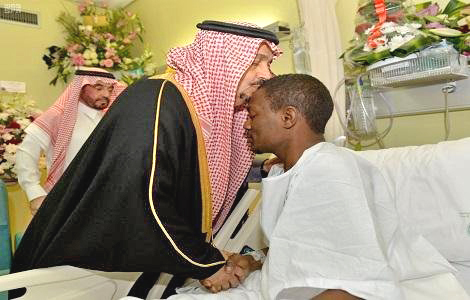Riyadh, Jan 12: Crown Prince Mohammed bin Naif, deputy premier and minister of interior, has ordered that the Order of Courage be conferred on all security personnel who participated in an operation that resulted in the elimination of wanted terrorists Tayea Salem bin Yaslam Al-Sayari and Talal bin Samran Al-Saedi in Riyadh on Saturday morning.
 The crown prince also ordered the promotion for three security men who participated in the operation.
The crown prince also ordered the promotion for three security men who participated in the operation.
The crown prince also telephoned Cpl. Gibran Jaber Awagy, who is receiving treatment at the Security Forces Hospital in Riyadh for an injury sustained in the operation.
During the call, the crown prince was reassured of the state of health and medical care the patient was receiving at the hospital. He also conveyed him the greetings of King Salman for his early recovery.
Crown Prince Mohammed praised the efforts of Awagy and his colleagues to defend their motherland and for their valor displayed during the operation.
Meanwhile, Riyadh Gov. Prince Faisal bin Bandar received at his office security men who participated in the gunbattle against the terrorists in Al-Yasmin district in northern Riyadh.
Addressing them, Prince Faisal said: “You were sincere and brave in your work. You are everybody’s pride. Now we see our security operations getting coverage by the global media gaining praise in countries, some of which were ahead of us in training and follow up. But we have preceded them in many matters with firmness, resolve sincerity and loyalty in such situations.”
Later Monday, the governor visited Awagy on hospital. He wished him speedy recovery.
What Awagy and his colleagues carried out was “a heroic act” that was executed precisely and diligently, Prince Faisal said.





Comments
Add new comment